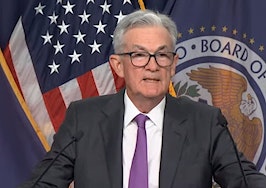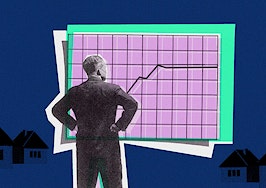No one can predict the future, but you can prepare. Find out what to prepare for and pick up the tools you’ll need at the immersive Virtual Inman Connect on Nov. 1-2, 2023. And don’t miss Inman Connect New York on Jan. 23-25, 2024, where AI, capital and more will be center stage. Bet big on the roaring future, and join us at Connect.
Homebuyer demand for purchase mortgages fell for a fourth consecutive week last week as rates continued to climb and inventories of homes for sale remained scarce, according to a weekly survey of lenders by the Mortgage Bankers Association (MBA).
The MBA Weekly Mortgage Applications Survey shows applications for purchase loans were down by a seasonally adjusted 3 percent last week compared to the week before and 27 percent from a year ago. Requests to refinance were down 4 percent week over week and 37 percent from a year ago.

Joel Kan
“Treasury yields rates rose last week and mortgage rates followed suit due to a combination of the Treasury’s funding announcement and the downgrading of the U.S. government debt rating,” MBA Deputy Chief Economist Joel Kan said in a statement.
In a separate report, the MBA said lending standards also tightened in July to the lowest level since 2013 as lenders pulled back on underutilized loan programs and liquidity concerns remained for some banks that make jumbo loans.
Mortgage credit availability declines to lowest level since 2013

The MBA’s Mortgage Credit Availability Index, which is based on an analysis of data from ICE Mortgage Technology, fell by 0.3 percent in July to 96.3. The MCAI is benchmarked to March 2012, with readings below 100 indicating that credit is tighter than it was at that time.
A component index measuring jumbo loan availability fell 0.8 percent, while credit eased 0.2 percent for conforming loans eligible for purchase by Fannie Mae and Freddie Mac.
“Declining origination volumes have led to lower profitability for many lenders, resulting in narrower loan product offerings to reduce operational costs,” Kan said in a statement. “One key driver of this month’s decline was a drop in cash-out refinance loan programs.”
Mortgage rates near 2023 peaks
Black Knight’s Optimal Blue Mortgage Market Indices, which track daily rate lock data, show rates on 30-year fixed-rate conforming mortgages last week matched a 2023 high of 7.02 percent originally registered on July 7. Since matching that high on Aug. 7, rates on conforming loans have eased slightly, averaging 6.98 percent Tuesday.
Jumbo mortgages, which hit a 2023 peak of 7.34 percent on July 28, have mostly stayed above 7 percent, averaging 7.11 percent on Tuesday.
After pausing in June, the Federal Reserve on July 26 approved its 11th increase in the federal funds rate since March 2022, bringing the short-term benchmark rate to the highest level since 2001.
The CME FedWatch Tool, which monitors futures markets to gauge investor sentiment of the Fed’s next moves, puts the odds that the Fed will hike rates at least one more time this year at 25 percent.
For the week ending Aug. 4, the MBA reported average rates for the following types of loans:
- For 30-year fixed-rate conforming mortgages (loan balances of $726,200 or less), rates averaged 7.09 percent, up from 6.93 percent the week before. With points increasing to 0.70 from 0.68 (including the origination fee) for 80 percent loan-to-value ratio (LTV) loans, the effective rate also increased.
- Rates for 30-year fixed-rate jumbo mortgages (loan balances greater than $726,200) averaged 7.04 percent, up from 6.89 percent the week before. With points increasing to 0.66 from 0.58 (including the origination fee) for 80 percent LTV loans, the effective rate also increased.
- For 30-year fixed-rate FHA mortgages, rates averaged 7.02 percent, up from 6.85 percent the week before. With points increasing to 1.14 from 1.05 (including the origination fee) for 80 percent LTV loans, the effective rate also increased.
- Rates for 15-year fixed-rate mortgages popular with homeowners who are refinancing averaged 6.51 percent, up from 6.39 percent the week before. With points increasing to 0.92 from 0.78 (including the origination fee) for 80 percent LTV loans, the effective rate also increased.
- For 5/1 adjustable-rate mortgages (ARMs), rates averaged 6.36 percent, up from 6.18 percent the week before. With points increasing to 1.2 from 1.16 (including the origination fee) for 80 percent LTV loans, the effective rate also increased.
Get Inman’s Mortgage Brief Newsletter delivered right to your inbox. A weekly roundup of all the biggest news in the world of mortgages and closings delivered every Wednesday. Click here to subscribe.
Email Matt Carter












